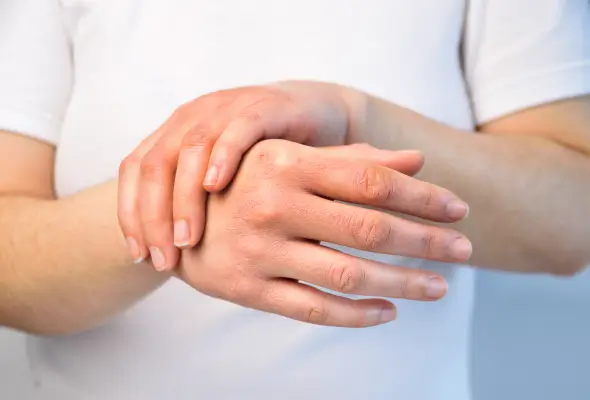-
Doctors
-
Specialities & Treatments
Centre of Excellence
Specialties
Treatments and Procedures
Hospitals & Directions HyderabadCARE Hospitals, Banjara Hills CARE Outpatient Centre, Banjara Hills CARE Hospitals, HITEC City CARE Hospitals, Nampally Gurunanak CARE Hospitals, Musheerabad CARE Hospitals Outpatient Centre, HITEC City CARE Hospitals, Malakpet
HyderabadCARE Hospitals, Banjara Hills CARE Outpatient Centre, Banjara Hills CARE Hospitals, HITEC City CARE Hospitals, Nampally Gurunanak CARE Hospitals, Musheerabad CARE Hospitals Outpatient Centre, HITEC City CARE Hospitals, Malakpet Raipur
Raipur
 Bhubaneswar
Bhubaneswar Visakhapatnam
Visakhapatnam
 Nagpur
Nagpur
 Indore
Indore
 Chh. Sambhajinagar
Chh. SambhajinagarClinics & Medical Centers
Book an AppointmentContact Us
Online Lab Reports
Book an Appointment
Consult Super-Specialist Doctors at CARE Hospitals

Cold Hands
Symptom, Causes, Diagnosis and Treatment
Cold Hands
Cold hands are a common issue that many people experience, particularly during colder months or in air-conditioned environments. This is not just a minor inconvenience, often causing discomfort and affecting daily activities. Understanding the cold hands causes is crucial to finding effective solutions. This article explores the reasons behind persistently cold hands, ranging from poor circulation to more serious medical conditions.

What are Cold Hands?
Cold hands are a common experience that many people encounter, especially in chilly environments or air-conditioned spaces. Most of the time, when hands feel cold, it is simply because the rest of the body is cold, too. This is the body's natural response to protect vital organs in cold conditions.
The body has a mechanism to conserve heat by restricting blood flow to the hands. Blood travels from the heart to the hands through the ulnar and radial arteries in the forearm. When exposed to cold, the muscles around these arteries tighten, redirecting blood flow to essential organs like the heart and lungs.
However, if hands feel cold all the time, even in comfortable temperatures, it might indicate an underlying issue affecting blood flow. This constant coldness can be a symptom of various health conditions that impact hand circulation.
Symptoms of Cold Hands
Cold hands are a common occurrence. They can sometimes be accompanied by other symptoms that may indicate an underlying health issue. These are:
- Change in Skin Colour: The affected areas may appear pale or have a bluish tint, particularly at the fingertips. This discolouration often results from reduced blood flow to the extremities.
- Pain or Discomfort: It can be a mild ache to a more intense, throbbing sensation.
- Tingling or Numbness in The Fingers: A tingling sensation may occur, which can be bothersome during daily activities.
- Ulcers on The Fingers: These small, painful sores can appear when blood flow to the hands is severely restricted for prolonged periods. In more severe cases, the skin on the hands may feel tighter or harder than usual, indicating potential tissue damage.
Cause and Risk factors of cold hands
Cold hands can result from various factors, including:
- Poor Circulation: When exposed to cold temperatures, the body redirects blood flow to vital organs, causing hands to feel chilly.
- Raynaud's Syndrome: This condition causes blood vessels in the fingers to constrict suddenly, leading to discolouration and coldness.
- Autoimmune Disorders: Lupus and scleroderma can also cause cold hands, often associated with Raynaud's syndrome.
- Hypothyroidism: It can increase sensitivity to cold, making hands feel colder than usual.
- Vitamin Deficiencies: A deficiency of Vitamins like B-12 may cause neurological symptoms, including cold hands.
- Heart Disease: They cause atherosclerosis, narrowing arteries, and potentially leading to cold hands.
Risk factors include:
- Smoking, which narrows blood vessels
- Diabetes, which can affect circulation.
- Prolonged exposure to cold environments
- Frequent use of vibrating tools can affect blood flow to the hands.
Complications
Cold hands are typically not a cause for serious concern. Rarely, they can lead to complications, primarily when associated with underlying health conditions.
- Tissue Damage: When blood flow to the hands is consistently restricted, it can result in inadequate oxygen and nutrient supply to the tissues. Over time, this can cause ulcers on the fingers or hands. These ulcers may become painful and may lead to permanent damage if left untreated.
- Gangrene: When ulcers are severe and go untreated for an extended period, there is a risk of developing gangrene. In the most severe instances, it may lead to tissue death, which requires amputation of the affected hand or fingers.
Diagnosis
Diagnosing the cause of cold hands typically begins with a thorough physical examination and reviewing the patient's medical history and cold hands symptoms.
- Cold Stimulation Test: Doctors may conduct a cold stimulation test when Raynaud's phenomenon is suspected. This test involves immersing the patient's hands in ice water and then measuring how long it takes for the finger temperature to return to normal. It likely indicates Raynaud's phenomenon if it takes 20 minutes or more.
- Additional Tests: Doctors may recommend other tests to identify any underlying disorders causing the cold hands. These tests can include:
- Nailfold Capillaroscopy: In this test, a drop of oil is placed at the base of a fingernail and examined under a microscope to detect abnormal arteries, which could suggest conditions like scleroderma.
- Blood Tests: To interpret immune system disorders. These can include antinuclear antibody (ANA) tests, erythrocyte sedimentation rate (ESR), and C-reactive protein tests.
Treatment for Cold Hands
The cold hand treatment depends on the underlying cause:
- For individuals with atherosclerosis, doctors may recommend lifestyle changes (maintaining a moderate weight and exercising regularly). They might also prescribe statins to lower cholesterol levels.
- In cases of anaemia, treatment options vary based on the type. Iron supplementation and dietary changes are common recommendations.
- For those with Raynaud's disease, stress management techniques and avoiding cold environments can help alleviate symptoms. In severe cases, doctors may recommend medication.
- To improve overall circulation and heart health, individuals can follow a healthful diet, exercise regularly, maintain a moderate weight, and manage stress.
- In some cases, medications may be prescribed to improve blood flow. These can include anticoagulants, antidepressants, and calcium channel blockers.
- Surgical options such as sympathectomy or vascular bypass may be considered for complex cases.
When to See a Doctor
While cold hands are often a normal response to temperature changes, there are instances when seeking medical advice is necessary. Consult a doctor if:
- If an individual experiences cold hands frequently in unusual circumstances, such as when not exposed to cool air
- If there are persistent symptoms of cold hands, especially when accompanied by certain signs like changes in skin colour, with hands appearing blue or white.
- If an individual experiences numbness or tingling sensations in the hands
- If an individual has pain or swelling in the hands, along with slow-healing sores or ulcers
Prevention
Preventing cold hands involves adopting various lifestyle changes and protective measures. These may include:
- One of the most effective strategies is limiting exposure to cold environments indoors and outdoors. Wearing appropriate warm gear, such as gloves or mittens, is crucial for protecting hands from chilly temperatures. Mittens are often more effective than gloves, allowing fingers to share warmth.
- Maintaining overall body warmth is equally essential. Layering clothing, using a scarf and wearing a hat can help retain body heat, reducing the likelihood of cold hands.
- Doctors generally advise wearing loose-fitting clothes, as tight garments can restrict blood flow and contribute to cold extremities.
- Regular exercise plays an elementary role in improving circulation. Daily physical activity, including simple exercises like walking or hand movements, can boost blood flow to the hands.
- Consuming foods that promote circulation, such as fatty fish, nuts, and olive oil, can be beneficial. Ginger is known for its thermogenic properties. It can help warm the body when consumed as tea.
- Avoid substances that can constrict blood vessels, such as tobacco, excessive alcohol, and caffeine. These can worsen the symptoms of cold hands. Instead, opt for warm, non-caffeinated beverages to help maintain body temperature.
- Following a skincare routine that protects the hands and using techniques like massage can help improve circulation and prevent cold hands.
Conclusion
Understanding the root causes of cold hands is crucial to address the issue effectively. There are various approaches to keeping hands warm and comfortable, Whether due to environmental factors, circulation problems, or underlying health conditions. People can improve their hand health and overall well-being by staying informed and taking proactive steps, ensuring that cold hands don't interfere with daily life or signal more serious health concerns.
FAQs
1. What do cold hands indicate?
Cold hands often indicate decreased blood flow to the extremities. This can be a normal reaction to cold temperatures or stress. However, persistently cold hands might suggest underlying conditions affecting circulation.
2. What deficiency causes cold hands?
Vitamin deficiencies, particularly vitamin B12, can contribute to cold hands. A lack of B12 may cause neurological symptoms, including the sensation of cold hands and feet, numbness, or tingling. Iron deficiency anaemia can also result in cold hands due to reduced tissue oxygen supply.
3. How do you treat cold hands?
Treatment for cold hands depends on the underlying cause. General strategies include wearing warm gloves, layering warmer clothes, managing stress, and protecting hands from cold exposure. For circulation issues, regular exercise and avoiding tobacco and excessive alcohol can help. Medicines or lifestyle changes may be recommended in cases of Raynaud's syndrome. Always consult a doctor for personalised treatment options.
4. Do cold hands mean stress?
Stress can indeed cause cold hands. When experiencing stress or anxiety, the body releases hormones like adrenaline, which can constrict blood vessels and redirect blood flow away from the extremities. This 'fight or flight' response can result in cold hands.
5. Can high blood pressure cause cold hands?
High blood pressure itself doesn't typically cause cold hands. However, certain medications used to treat high blood pressure may have side effects, including cold hands. Additionally, conditions that affect blood flow, such as peripheral artery disease, can cause high blood pressure and cold hands.
Still Have a Question?




